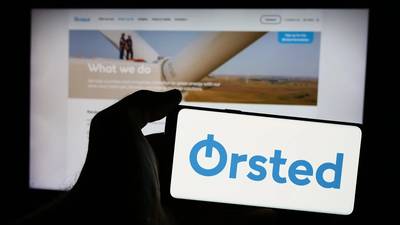Orsted Shares Drop as US Halts Offshore Rhode Island Wind Farm
Shares in Orsted plunged 17% on Monday after the U.S. halted the Danish company's Revolution Wind project off Rhode Island amid President Donald Trump's pushback on renewable energy investments.
Orsted, the world's biggest offshore wind farm developer, has already faced mounting challenges, including rising costs, higher interest rates, and supply chain disruptions, leading to delays and cancellations in the U.S. and other markets. The company's market value has plummeted 87% since its January 2021 peak.
The U.S. Bureau of Ocean Energy Management (BOEM) issued a work-stop order late on Friday for the $1.5 billion Revolution Wind project, which was 80% complete, with 45 out of 65 turbines installed. The wind farm was expected to supply electricity to 350,000 homes in Rhode Island and Connecticut starting next year.
It was BOEM's second major suspension of an offshore wind project this year, following its halt of Norwegian energy firm Equinor's Empire Wind 1 project off New York in April. Trump has repeatedly criticised wind energy as costly and unreliable, suspending new offshore wind leases pending environmental and economic reviews.
Despite the setback, Orsted, which is 50.1% owned by the Danish state, reiterated plans for a $9.4 billion emergency rights issue announced earlier this month, signalling it remains committed to its U.S. projects.
The rights issue is intended to strengthen the company's capital structure amid "material adverse developments in the U.S. offshore wind market." The company also recently cancelled the partial divestment of its Sunrise Wind project off New York.
The Danish finance ministry, which supports the rights issue, said in an emailed statement that the work-stop order was within the expected risk profile underpinning its participation in the capital raise.
Equinor, which holds a 10% stake in Orsted, reiterated that it will carefully evaluate the rights issue.
Orsted's shares, already down 30% since the rights issue was announced on August 11, hit a record low of 173.4 Danish crowns ($27.15) and were trading 16.1% lower at 179.6 crowns at 1437 GMT on Monday.
Analysts said the suspension of Revolution Wind could be reversed, citing Equinor's Empire Wind 1 project, which resumed operations after diplomatic efforts by Norway's government.
"The most likely scenario is that this will be solved in Orsted's favour, either with political help or in courtrooms," Sydbank analyst Jacob Pedersen said.
However, Denmark's strained relations with the U.S. following Trump's comments about wanting the U.S. to take over Greenland could complicate diplomatic efforts. On Friday, Denmark's Foreign Minister Lars Lokke Rasmussen signed an agreement in California to strengthen ties with Governor Gavin Newsom, who has openly criticized Trump.
Opposition lawmakers in Denmark questioned the government's support for Orsted's rights issue. Lars-Christian Brask, foreign policy spokesperson for The Liberal Alliance, suggested diplomatic efforts should be pursued but noted legal proceedings might offer the best chance for resolution.
"There's always a risk that Greenland will come up in the dialogue if the government goes directly to Trump," he told Reuters.
AlphaValue analyst Pierre-Alexandre Ramondenc said the U.S. administration's move could undermine Orsted's rights issue, calling the decision "political hostage-taking" given the project's advanced stage.
Governors Ned Lamont of Connecticut and Dan McKee of Rhode Island criticized the suspension in a joint statement, pledging to explore "every avenue" to reverse the order.
"This political move by the Trump administration will drive up the cost of electricity bills and contradicts everything the administration has told us," they said.
($1 = 6.3869 Danish crowns)
(Reuters)




